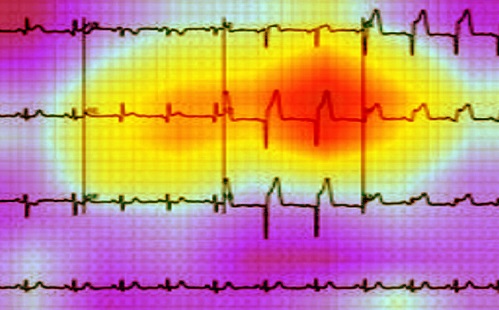Nikhil Prasad Fact checked by:Thailand Medical News Team Dec 30, 2024 1 year, 1 month, 1 week, 1 day, 17 hours, 35 minutes ago
Medical News: Researchers from multiple renowned institutions in South Korea, including the Bionics Research Center at the Korea Institute of Science and Technology (KIST), Korea University of Science and Technology, and Chungnam National University School of Medicine, have achieved a significant milestone in medical diagnostics. They developed an innovative deep learning model that leverages electrocardiogram (ECG) data to identify respiratory illnesses, specifically COVID-19 and influenza, alongside cardiovascular diseases and normal conditions. This achievement introduces a non-invasive, efficient, and cost-effective approach to tackling diagnostic challenges.
 ECG as a Tool to Diagnose Respiratory Illnesses Such as COVID-19 and Influenza
ECG as a Tool to Diagnose Respiratory Illnesses Such as COVID-19 and Influenza
The concurrent spread of respiratory illnesses such as influenza, coupled with the COVID-19 pandemic, has amplified the need for rapid and accurate diagnostic solutions. Current methods like RT-PCR for COVID-19 or rapid influenza tests are accurate but come with limitations, including time, cost, and patient discomfort during sample collection. This
Medical News report explores the researchers' groundbreaking study and its potential implications for global healthcare.
The Innovative Approach
The study aimed to explore the diagnostic potential of ECG - a tool traditionally used for heart conditions - for detecting respiratory diseases. Unlike numerical ECG data, which focuses on electrical signal time-series, researchers opted to use ECG images to highlight spatial patterns. These images were analyzed using a shallow residual network (ResNet), a specialized deep learning architecture.
The ResNet model, comprising four residual blocks, convolutional layers, and skip connections, processed short 5-second ECG recordings. This architecture was chosen to retain crucial information, minimize loss during analysis, and enhance classification accuracy. Notably, this approach diverges from traditional machine learning models like Linear Regression or transfer learning methods like VGG16 or DenseNet, emphasizing computational efficiency and adaptability.
Key Study Findings
The findings revealed that the ResNet model significantly outperformed other methods in diagnostic accuracy. The model demonstrated:
-87.8% accuracy in distinguishing normal from COVID-19 cases
-77.2% accuracy in differentiating normal from influenza cases
-95.4% accuracy in identifying COVID-19 vs. influenza cases
-For multi-class tasks, including normal, COVID-19, influenza, and cardiovascular diseases (CVD), the model achieved an impressive 86.2% accuracy.
The data used included ECG signals from individuals with normal health, COVID-19, influenza, and CVD. This classification showed the versatility of ECG data in addressing complex diagnostic challenges. The researchers also highlighted that ECG patterns could reflect disease-specific variations, including heart rate irregularities, inflammation
markers, and other systemic responses linked to respiratory conditions.
Benefits of ECG-Based Diagnosis
The use of ECG for diagnosing respiratory diseases offers several advantages:
-Non-Invasive and Rapid Data Collection: Unlike nasal swabs or imaging tests, ECGs are painless and provide real-time results.
-Accessibility: ECG machines are available in most healthcare facilities, making this approach practical even in resource-limited settings.
-Cost-Effectiveness: By reducing dependency on expensive molecular tests, this method can alleviate financial burdens on healthcare systems.
-Ease of Use: Wearable ECG devices, like smartwatches, could integrate this technology, enabling remote health monitoring and early detection.
Broader Implications and Future Applications
The success of this study paves the way for integrating ECG diagnostics into public health strategies, particularly during seasonal outbreaks of respiratory diseases. The model's ability to distinguish between COVID-19 and influenza is particularly valuable in "twindemic" scenarios, where co-circulating viruses exacerbate diagnostic burdens.
Wearable technology incorporating this model could transform personal health management, enabling individuals to monitor their symptoms and seek timely medical intervention. Additionally, the approach may help healthcare providers prioritize resources by identifying high-risk patients early.
Study Limitations and Future Directions
While the study's findings are promising, the researchers acknowledged limitations:
-Small Sample Size: The relatively small dataset necessitates further validation with larger and more diverse populations.
-Device Variability: Data collected from different ECG machines might introduce inconsistencies. Standardized equipment could enhance reliability.
-Factors: Variations in age and health status among participants could influence outcomes. Addressing these variables will be essential for future studies.
Future research could expand this model's applicability by including other respiratory diseases and refining its accuracy through larger datasets and advanced algorithms.
Conclusion
This study highlights the untapped potential of ECG data in diagnosing respiratory illnesses, marking a significant step toward accessible and efficient healthcare. By utilizing short-duration ECG recordings, the researchers demonstrated that even subtle variations in heart activity could provide critical diagnostic insights.
This approach promises to revolutionize diagnostics, offering a reliable, rapid, and non-invasive alternative to traditional methods. With further research and development, ECG-based models could become a cornerstone of global healthcare, particularly in combating pandemics and other public health challenges.
The study findings were published in the peer-reviewed journal: Biomedical Signal Processing and Control.
https://www.sciencedirect.com/science/article/pii/S1746809424014666
For the latest COPVID-19 News, keep on logging to Thailand
Medical News.
Read Also:
https://www.thailandmedical.news/news/pre-hospital-ecg-changes-linked-to-higher-mortality-in-covid-19-patients
https://www.thailandmedical.news/news/ai-in-medicine-yale-scientist-develop-ai-model-that-can-detect-left-ventricular-systolic-dysfunction-lvsd-from-ecgs-obtained-by-wearable-devices
